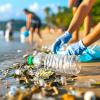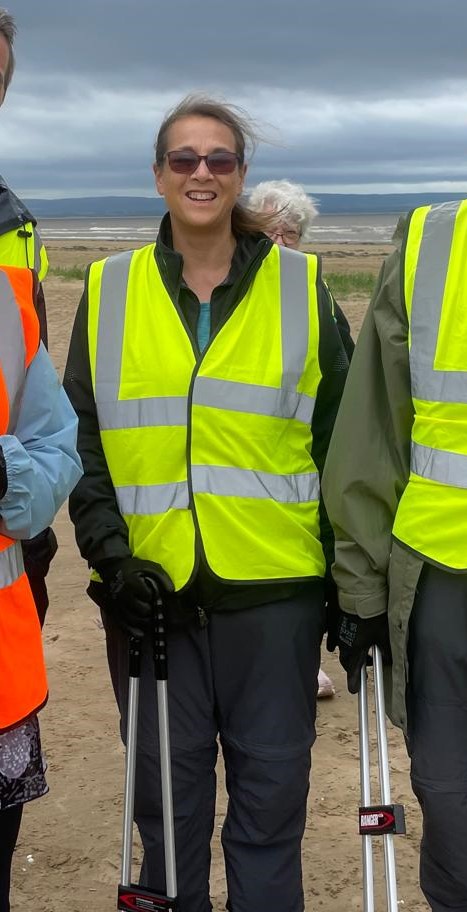
IIASA researcher, Linda See, shares her experiences at the coalface of where plastic pollution is collected by volunteers during a beach cleanup event.
Linda See on the beach with other volunteers during the event.
The increasing amounts of plastic debris accumulating in our terrestrial and marine water systems are causing severe environmental damage. This includes negative impacts on wildlife and human health, as well as damage to soils and groundwater supplies. The severity of the problem is recognized through the need to monitor marine plastic debris as part of the United Nations Sustainable Development Goals (SDG - Goal 14, Indicator 14.1.1b) as well as the recent Global Plastics Treaty, endorsed by 175 nations and set to become a legally binding agreement by the end of 2024.
I was fortunate enough to be part of recent research led by Dilek Fraisl, my colleague and a research scholar in the IIASA Novel Data Ecosystems for Sustainability (NODES) Research Group, which demonstrated how a stakeholder process led to Ghana officially reporting on indicator 14.1.1b using data from citizen science. Beach cleanup events in Ghana organized by NGOs like Smart Nature Freak Youth Volunteers Foundation and Plastic Punch, made use of a protocol developed by the Ocean Conservancy and resulted in the collection of valuable information on the amount of plastic debris washing up on Ghanaian beaches. Without the dedication of the many volunteers who collect, sort, and measure the debris, and the progressive attitude of the Ghanaian Statistical Office, the Ministry of Environment, and organizations like the United Nations Environment Programme (UNEP), this would not have been possible.
Sometimes the research you do, however, leaves you a bit far removed from the realities on the ground as much of the work that Dilek did was opening up communication channels between the key stakeholders and finding a way for all parties to validate the citizen science data on marine plastics for official SDG reporting. Hence, when the opportunity arose, I took part in a beach cleanup event organized by a local community group in mid-August. We were supplied with high visibility vests, garbage bags, and garbage pickers, and directed to the beach area with instructions to pick up plastics as well as any other man-made objects.
For the next two hours, around 30 of us roamed the beaches and neighboring sand dunes looking for plastic debris. The most common things that I found were plastic bottle tops, plastic straws, fishing string, and plastic bags, often mostly buried in the sand. Others found large fishing nets and syringes. However, one of the more disturbing things was the amount of microplastics that was scattered around. The pickers were surprisingly capable of grabbing even these small plastic pieces, but the scale of the problem was all too evident from the small stretch of beach that I examined.
By the end of the two hours, many garbage bags had been filled, and coffee and cake were rewards for taking part. We didn’t, however, document and weigh the plastics, nor did we follow any protocols for measuring the area covered, both of which would have provided valuable data on the amount of plastic debris found on the beach. This makes me admire the efforts of organizations like Ocean Conservancy and the NGOs operating in Ghana (and in many other countries) even more. But it did make me realize, in a very tangible way, just how serious this problem is, and that anyone can take part and improve their local environment, even if they are not collecting data for scientific purposes.
It is heartening to see that the issue of plastic pollution and the role that citizen science can play in addressing it is increasingly being recognized globally. We were very excited to learn that our paper on the subject recently won the Outstanding Paper Award from the journal Sustainability Science. Congratulations to all the authors!
Reference
Fraisl, D., See, L., Bowers, R., Seidu, O., Boakye Fredua, K., Bowser, A., Meloche, M., Weller, S., Amaglo-Kobla, T., Ghafari, D., Laso Bayas, J.C., Campbell, J., Cameron, G., Fritz, S., McCallum, I. (2023). The contributions of citizen science to SDG monitoring and reporting on marine plastics. Sustainability Science. DOI: 10.1007/s11625-023-01402-4
Note: This article gives the views of the author, and not the position of the IIASA blog, nor of the International Institute for Applied Systems Analysis.
